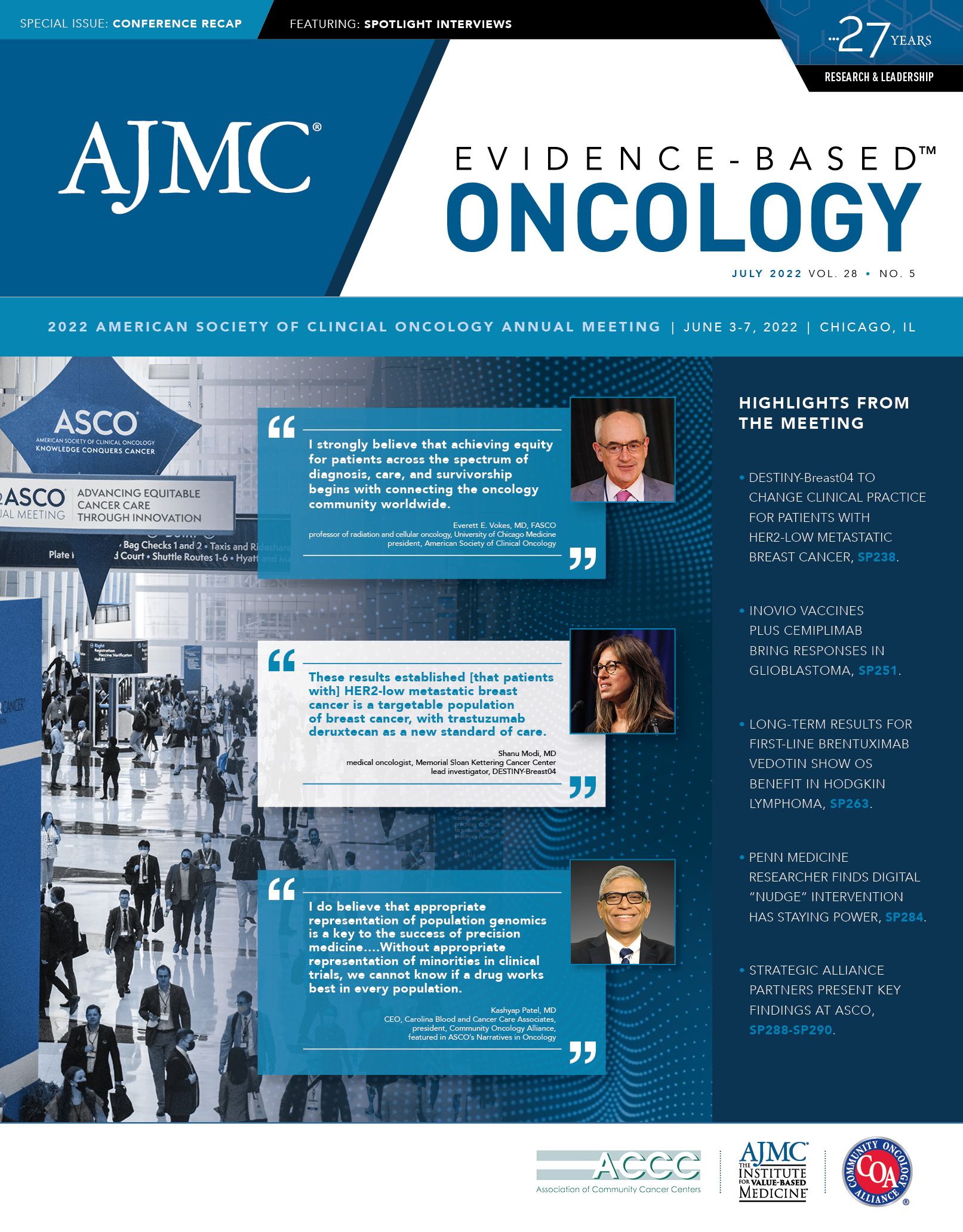- Center on Health Equity & Access
- Clinical
- Health Care Cost
- Health Care Delivery
- Insurance
- Policy
- Technology
- Value-Based Care
Lucitanib With Nivolumab Sees Responses in Gynecological Cancer Treatment
Lucitanib is a novel dual inhibitor that targets human vascular endothelial growth factor receptors (VEGFRs) and fibroblast growth factor receptors (FGFRs) and restricts the blood supply feeding the tumors. In this case, lucitanib blocks VEGFR 1-3 and FGFR1/2 kinases, leading to tumor cell death.
The LIO-1 study (NCT04042116) is examining the combination of lucitanib with the PD-1 inhibitor nivolumab across a range of solid tumor cancers. During the 2022 annual meeting of the American Society of Clinical Oncology, Manish R. Patel, MD, director of drug development at Florida Cancer Specialists/Sarah Cannon Research Institute in Sarasota, Florida, presented findings from the phase 1/2 dose escalation study evaluating lucitanib with nivolumab in advanced gynecological cancers, including cervical cancer (CC), endometrial cancer (EC), and ovarian cancer (OC).
The following patients were enrolled: those with EC who had received at least 1 prior platinum-based chemotherapy; patients with CC who had received chemotherapy with or without bevacizumab; patients with high-grade OC who had received at least 2 prior chemotherapy lines; and those with EC or OC with clear-cell histology who had received at least 1 prior platinum-based chemotherapy plus taxane. Patients with prior PD-1 or PD-L1 therapy were excluded, except for 10 patients in the EC group.
Dosing. Patients started with 6 mg of lucitanib daily, escalating to 8 mg per day and then 10 mg per day if safety criteria were met, along with intravenous nivolumab 480 mg every 28 days. At the time of data cutoff, 31 of 124 patients were continuing in the study. Across cohorts, 32 (26%) patients escalated to the 8-mg dose and 20 (16%) escalated to the 10-mg dose. More patients continued in the CC cohort in phase 2 of the trial.
Results. Updated data presented in a poster showed responses as follows:
A confirmed overall response rate (ORR) was seen in 5 of 22 patients with EC (22.7%; 5 partial responses [PRs]).
12 of 46 responses were reported in patients with CC (26.1%; 2 complete responses [CRs], 10 PRs).
4 of 33 responses were reported in patients with OC (12.1%; 4 partial responses).
6 of 23 responses were reported in patients with EC/OC clear cell (21.7%; 1 CR, 5 PRs).
Response duration ranged from 1.9 to 13.1+ months in the CC cohort, 5.6 to 14.8+ months in the EC cohort, 3.7 to 14.9+ months in the OC cohort, and 3.5 to 10.4+ in the EC/OC clear cell cohort.
Of 5 patients with EC with prior PD-1 inhibitor treatment, 2 had PRs and 1 had stable disease of more than 7 months.
Across the cohorts, the median duration of lucitanib and/or nivolumab treatment was 3.7 months (range, < 0.1-17.5). At cutoff, 37 patients (30%) had remained on 1 or both therapies for at least 6 months. Of the 124 patients, 50 (40%) met the bar for dose escalation at cycle 2, 63 (51%) were ineligible, and 11 (9%) did not reach cycle 2.
Of the 124 total patients, 115 had treatment-emergent adverse events (TEAEs) related to the study; 44% were grade 3 or higher. The most common TEAE was hypertension. Of the group, 21 patients had a dose reduction in lucitanib and 14 patients had TEAEs related to lucitanib that led to discontinuation. Safety results were similar across tumor types. Investigators concluded that the combination of lucitanib and nivolumab in advanced gynecological malignancies “has a manageable safety profile through effective dose titration.”
Reference
Patel MR, Makker V, Oaknin A, et al. Efficacy and safety of lucitanib + nivolumab in patients with advanced gynecologic malignancies: phase 2 results from the LIO-1 study (NCT04042116; ENGOT-GYN3/AGO/LIO). J Clin Oncol. 2022;40(suppl 16):5517. doi:10.1200/JCO.2022.40.16_suppl.5517

Building Trust: Public Priorities for Health Care AI Labeling
January 27th 2026A Michigan-based deliberative study found strong public support for patient-informed artificial intelligence (AI) labeling in health care, emphasizing transparency, privacy, equity, and safety to build trust.
Read More
Ambient AI Tool Adoption in US Hospitals and Associated Factors
January 27th 2026Nearly two-thirds of hospitals using Epic have adopted ambient artificial intelligence (AI), with higher uptake among larger, not-for-profit hospitals and those with higher workload and stronger financial performance.
Read More
